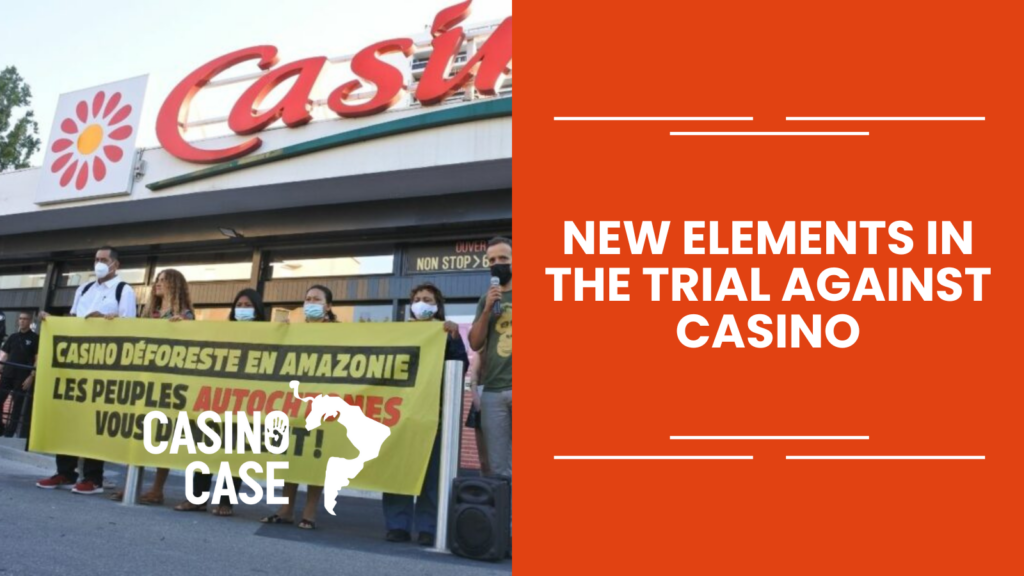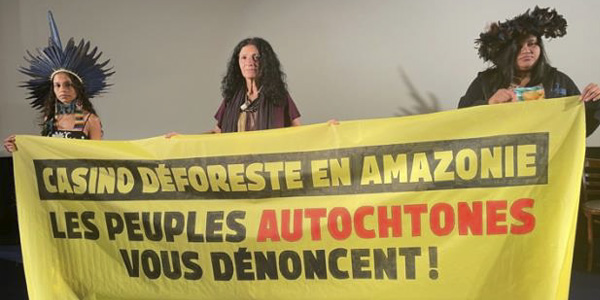
PRESS RELEASE:
People seriously affected by cattle farming in Brazil, new evidence in the case against Casino
Paris – 31 May 2022 – On the occasion of the visit by representatives of the Uru-Eu-Wau-Wau indigenous people, the CCCA (Center for Climate Crime Analysis) is unveiling the results of a new field investigation carried out in the Brazilian Amazon. Their report describes the illegal deforestation carried out in a protected indigenous territory in the state of Rondônia for the benefit of cattle farming, and provides new incriminating evidence in the case brought in France against Casino for breach of its duty of care.
INVASION OF THE TERRITORIES OF THE RONDÔNIA PEOPLES IN BRAZIL FOR THE BENEFIT OF CATTLE FARMING
Field investigations carried out by the CCCA have revealed illegal invasions of the Uru-Eu-Wau-Wau indigenous territory, located in the heart of the Amazonian region of Rondônia, for the benefit of cattle farms. 25,482 cattle are illegally present in the reserve and 13,411 hectares of forest have been cleared for grazing, an area larger than the city of Paris.
These surveys also document the many consequences of these invasions for the indigenous peoples concerned:
- The environmental damage caused by deforestation and cattle farming is estimated at over €128 million (based on the loss of ecosystem services, the cost of rehabilitation and the opportunity costs of land use).
- There are also threats to the security, livelihoods and very culture of the indigenous peoples. ‘The people of the Uru-Eu-Wau-Wau indigenous lands have suffered from a constant and expanding encirclement of their territory that threatens their lives says one member of the indigenous people. We are all under threat, and there are many of them. All the villages are affected. They say they’re going to finish off the indigenous people […] It’s risky to walk alone and be captured. It’s dangerous to go into town‘.
- There is also a health impact, according to the testimonies: ‘Invaders have also violated the rights of isolated indigenous populations by coming into contact with them, even though these people with no immunological memory are particularly vulnerable, especially in times of pandemics‘.
According to the CCCA, these invasions of indigenous lands, their deforestation, use for grazing, cattle rearing and their destination for consumption constitute illegal activities under Brazilian law.
The link to the full report ‘THE CONNECTIONS BETWEEN THE CASINO GROUP’S VALUE CHAIN, DEFORESTATION AND VIOLATIONS OF THE INDIGENOUS URU-EU-WAU IN BRAZILIAN AMAZONIA’ published today.
CASES OF ILLEGAL DEFORESTATION IN THE CASINO GROUP’S SUPPLY CHAIN
Using official animal transport documents, three farms located in the Uru-Eu-Wau-Wau indigenous territory were identified as being connected to the supply chain of a slaughterhouse belonging to the Brazilian company JBS, which supplied Casino Group shops in Brazil. These farms are responsible for 340 hectares of illegal deforestation. With only 10% of cattle produced in the indigenous territory showing official animal transport documents, corporate responsibility could be even greater.
Rhavena Terto Madeira, Director of CCCA Brazil, said: ‘Casino Group’s commitments to eliminate deforestation are not just unsatisfactory. These new elements show that the Casino Group could also be responsible for this environmental damage under Brazilian law, by consent or omission’.
For the organisations that took the Casino Group to court, this investigation illustrates the consequences of the company’s failure to comply with its due diligence. The legal action, initiated in Saint-Étienne, has been referred to the Judicial Court of Paris, which was designated at the end of 2021 as having jurisdiction over disputes based on the law on the due diligence. The hearing to set the timetable for the proceedings will take place on 9 June 2022. Actions by other local delegations are in preparation.
MOBILISATION IN FRANCE: INDIGENOUS PEOPLES’ REPRESENTATIVES VISIT PARIS, A DEDICATED INFORMATION WEBSITE
Rhavena Terto Madeira was present at the unveiling of the CACB report in France on Tuesday 31 May 2022 as part of a meeting with French NGOs and civil society:

Alice Pataxó, from the Pataxó indigenous people of Bahia, a 20-year-old activist who spoke out at COP26 in Glasgow, denouncing deforestation in the Amazon and defending the rights of indigenous peoples.
Tejubi from the Uru-Eu-Wau-Wau indigenous people of Rondônia, a 21-year-old indigenous leader. She is a member of the Jupaú association, which leads the fight to defend the rights of her people and for the development of sustainable projects on their lands.
Neidinha Bandeira, an emblematic activist who heads The Kanindé Association for the defense of the ethno-environment, which works with 52 indigenous ethnic groups to stop invading cattle breeders and illegal loggers.
The coalition of French and international organisations and indigenous representatives that took the Casino Group to court is also launching its dedicated website, nourishunmondedeforeste.org, to help raise awareness of this major issue: Brazil’s two biggest retailers, Carrefour and Casino, are French, and beef, which is the main source of deforestation in the Amazon, is sold in Brazil.
